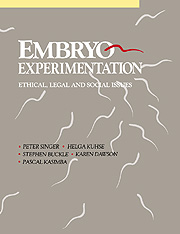Book contents
- Frontmatter
- Contents
- Foreword
- ACKNOWLEDGEMENTS
- INTRODUCTION
- PART 1 THE SCIENTIFIC ISSUES
- PART 2 THE ETHICAL ISSUES
- ARGUMENTS ABOUT THE STATUS OF DIFFERENT DEVELOPMENTAL STAGES
- ARGUMENTS FROM POTENTIAL
- 8 IVF technology and the argument from potential
- 9 Arguing from potential
- EMBRYO RESEARCH AND WOMEN
- PART 3 CONTROLLING EMBRYO EXPERIMENTATION IN A DEMOCRATIC SOCIETY
- FORMING A PUBLIC POLICY
- LEGISLATION AND ITS PROBLEMS
- APPENDICES
- GLOSSARY
- NOTES ON CONTRIBUTORS
- INDEX
9 - Arguing from potential
Published online by Cambridge University Press: 05 June 2012
- Frontmatter
- Contents
- Foreword
- ACKNOWLEDGEMENTS
- INTRODUCTION
- PART 1 THE SCIENTIFIC ISSUES
- PART 2 THE ETHICAL ISSUES
- ARGUMENTS ABOUT THE STATUS OF DIFFERENT DEVELOPMENTAL STAGES
- ARGUMENTS FROM POTENTIAL
- 8 IVF technology and the argument from potential
- 9 Arguing from potential
- EMBRYO RESEARCH AND WOMEN
- PART 3 CONTROLLING EMBRYO EXPERIMENTATION IN A DEMOCRATIC SOCIETY
- FORMING A PUBLIC POLICY
- LEGISLATION AND ITS PROBLEMS
- APPENDICES
- GLOSSARY
- NOTES ON CONTRIBUTORS
- INDEX
Summary
One of the more common arguments employed in attempts to determine how we should treat the earliest forms of human life is the argument from potential. Typically, the argument holds that we should not interfere with, and perhaps should even assist, the development of the human fertilized egg because it already possesses the potential to be a fully self-conscious being; to be, that is, not merely a biologically human being (a human object), but a human subject. It is, potentially, just like us, so we cannot deny it any rights or other forms of protection that we accord ourselves. The argument holds that, although the fertilized egg is not just like us in possessing rationality, self-consciousness, etc., this is a difference which is not fundamental, because it is overcome in time through the normal course of events. The normality in question is not statistical but biological, and is a matter of the proper functioning of biological processes. Proper functioning, in its turn, depends on the presence of an appropriately sympathetic environment. The fertilized egg is not ‘just like us’ only in the sense that it is not yet just like us. Therefore, the argument concludes, we should not interfere with its natural development towards being a rational, self-conscious being. On its strongest interpretation, the argument is thought to establish that we should treat a potential human subject as if it were already an actual human subject.
- Type
- Chapter
- Information
- Embryo Experimentation , pp. 90 - 108Publisher: Cambridge University PressPrint publication year: 1990
- 13
- Cited by



